牛津初中英语八年级上学期Unit 8 English Week单元知识总结及单元测试
牛津译林版八年级上册第八单元知识点

牛津译林版八年级上册第八单元知识点v.“摇动,颤抖”At first。
I XXX一开始,我感觉到了轻微的震动。
2)slight adj.轻微的,微小的XXX een the two products is only XXX这两种产品之间的差别只是微小的。
3)at first起初,一开始At first。
I didn't like the idea。
but now I think it's great.起初我不喜欢这个想法,但现在我觉得它很棒。
He shook his head to refuse my request。
The act of shaking one's head can mean to refuse or deny something。
It XXX for the first time。
People were running in all ns outside。
dodging XXXXXX the post office。
following a specific XXX guidance。
trends。
or goals。
I XXX。
The word "beat" can mean to strike。
as well as to defeat or win against someone or something。
The difference een "win" and "beat" XXX - "win" XXX prizes。
while "beat" is used with XXX。
The thief ran into the supermarket。
prompting the police to enter in pursuit。
The missing word is "n."They won the match this time。
牛津译林版8上Unit 8单词知识点

牛津译林版8上Unit 8单词知识点1.disaster(s)灾难;祸患n. natural disasters2.mop用拖把擦干净vt. mops, mopped, mopping mop the floor up把地板拖干净3.thousands of people成千上万的人two thousand people 两千人hundreds of成百上千的millions of 成百万的(百,千,百万前有准确数值时不加s和of)(区分:Two thousand of the books in our school library were donated by him.我们图书馆中有2000本书是由他捐献的。
)4.accident (s)事故,意外的事 n. a car accident一起车祸An accident happened on that day.那天发生了一起事故。
5.coach(es)长途汽车n. go to sp by coach/on a coach=take a/the coach to sp6.crash猛撞,碰撞v. crashes, crashed, crashing crash into a tree撞到树上7.wash away the village冲走村庄wash it/them away(代词只能放中间)8.hear sth./sb.(亲耳)听见 hear about/of(间接)听说hear from him收到他的来信9.catch fire着火 (过去式caught fire)The thief was caught by the policeman.那个贼被警察抓住了。
Catch the ball!接住球I got up early to catch the early bus.我早起去赶早班车。
10.shake 摇动,震动n./v. shakes, 过去式shook, shakingfeel a slight shake/shaking through my body感觉浑身轻微震动11.loud大声的adj/大声地adv Please speak loud/louder.请大声些。
牛津版沪教版英语八年级(上)Unit 8 English week 语法讲解+练习+答案

牛津版沪教版英语八年级(上)Unit 8English week 语法讲解+练习+答案XXX about an n or state。
They cannot be used as a predicate alone and must be combined with a verb in its base form to form a XXX modal verbs。
but they have a wide range of uses。
including can。
may。
must。
have/has to。
had better。
ought to。
shall。
will。
need。
and dare。
In affirmative sentences。
they often n as a main verb。
while in negative and interrogative sentences。
they n as modal verbs.The modal verb should is used to XXX。
"XXX."To improve your English。
it is mended that you read English books and magazines。
as well as watch English n programs。
During class。
XXX。
When speaking in English。
Emily should XXX。
XXX。
It is followed by the base form of a verb and its negative form is should not (shouldn’t)。
When used in a n。
should is placed at the beginning of the sentence。
It does not change for person or number。
深圳牛津英语八上Unit 8 English Week

Unit 8 English WeekLesson 1教学目标词组A1. treasure hunt寻宝游戏2. in public公开地; 在别人面前3. put on上演4. in my opinion依我看5. above all最重要的是; 尤其是6. communicate with sb和某人沟通交流7. make a speech 做演讲8. look out 小心; 当心9. singing competition歌唱比赛10.take part in参加(活动、比赛、游戏等)11. watch television programmes看电视节目12. be worth doing值得做某事词组B1.a big success一次巨大的成功2.the whole school整个学校3.improve my English提高我的英语4. advise sb to do sth建议某人做某事5. so…that…如此……以至于……6.one of………之一7.be good at擅长8. ask sb. to do sth. 要求某人做某事9.a few一些10.more than超出; 不止一个英英释义1. in my opinion= in my view=personally2. take part in=join in3. the whole school=all the school课文English: fun for lifeEnglish Week at Rosie Bridge SchoolLast week, students at Rosie Bridge School worked hard to make their English Week a big success. There was an English book fair in the library and a treasure hunt. Some students put on an English play. Other students took part in an English singing competition. There was also a speaking competition. The students had to speak on a topic in English for two minutes.We spoke to the winner, Henry. “I’m so happy that I won,” he said. “I advise people to speak slowly. If they want to be good public speakers, they’d better speak clearly and confidently.”We also spoke to several other students about English Week. One of them was Amy.“I really enjoyed English Week. It gave me a chance to learn new words. In my opinion, every school should have an English Week. It’s well worth doing,” she said.On the last day of English Week, the head teacher gave a speech to the whole school. He gave students some suggestions on how to improve their English. “You should communicate in English with your friends whenever you can. You should read English books and magazines, and watch English television programmes. Above all, you should enjoy English!” he said.重点句型解析A1.There can be more than one answer. 可能有多个答案。
牛津译林版八年级英语上册Unit8知识点总结
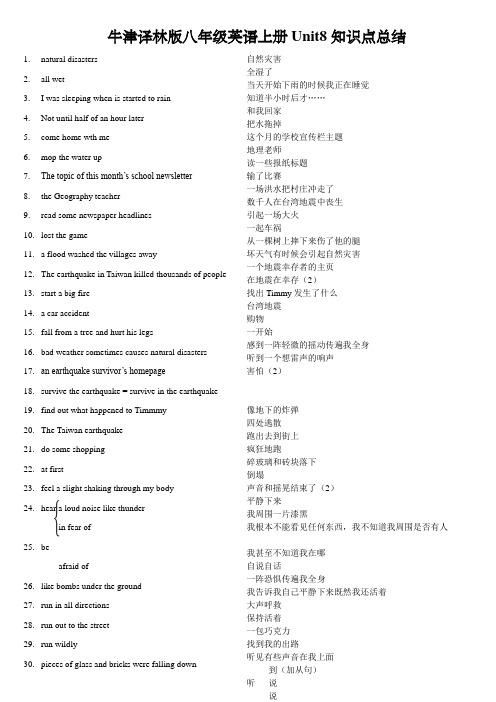
146.look for a video about earthquakes
147.The video shows the terrible situation after the earthquake
148.help people get out from under all the stones and bricks
35.I counld not see anything at all and I did not know if
anyone was around me
36.I did not even know where I was
37.say to oneself
38.A moment of fear went though my mind
57.Timmy was trapped in a dark place
58.have nothing to eat
59.look at the weather forecast on the Internet
60.the weather today = today’s weather
61.be around 7℃
111.bad weather can be dangerous
112.e-mail me soon
113.Tell your partner about a natural disaster you heard about
from your online friend
114.hear about
115.a heavy storm with thunder and lightning
17.an earthquake survivor’s homepage
牛津深圳版英语八年级上Unit8 English Week 单词+语法(情态动词should,had better)(无答案)
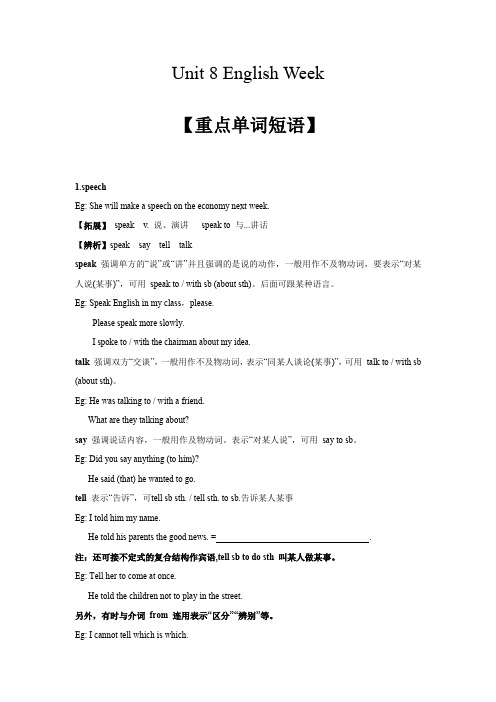
Unit 8 English Week【重点单词短语】1.speechEg: She will make a speech on the economy next week.【拓展】speak v. 说、演讲speak to 与...讲话【辨析】speak say tell talkspeak 强调单方的“说”或“讲”并且强调的是说的动作,一般用作不及物动词,要表示“对某人说(某事)”,可用speak to / with sb (about sth)。
后面可跟某种语言。
Eg: Speak English in my class,please.Please speak more slowly.I spoke to / with the chairman about my idea.talk 强调双方“交谈”,一般用作不及物动词,表示“同某人谈论(某事)”,可用talk to / with sb (about sth)。
Eg: He was talking to / with a friend.What are they talking about?say 强调说话内容,一般用作及物动词。
表示“对某人说”,可用say to sb。
Eg: Did you say anything (to him)?He said (that) he wanted to go.tell 表示“告诉”,可tell sb sth. / tell sth. to sb.告诉某人某事Eg: I told him my name.He told his parents the good news. = .注:还可接不定式的复合结构作宾语,tell sb to do sth 叫某人做某事。
Eg: Tell her to come at once.He told the children not to play in the street.另外,有时与介词from 连用表示“区分”“辨别”等。
Unit8+语法知识点汇总 牛津译林版英语八年级上册
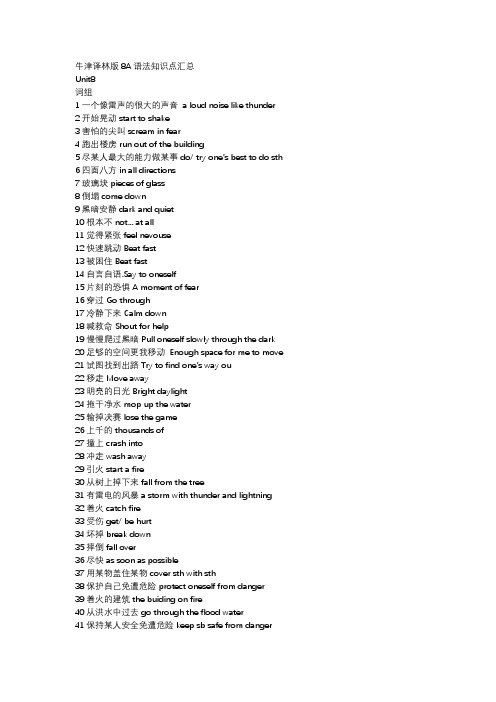
牛津译林版8A语法知识点汇总Unit8词组1一个像雷声的很大的声音a loud noise like thunder 2开始晃动start to shake3害怕的尖叫scream in fear4跑出楼房run out of the building5尽某人最大的能力做某事do/ try one’s best to do sth 6四面八方in all directions7玻璃块pieces of glass8倒塌come down9黑暗安静dark and quiet10根本不not... at all11觉得紧张feel nevouse12快速跳动Beat fast13被困住Beat fast14自言自语.Say to oneself15片刻的恐惧A moment of fear16穿过Go through17冷静下来Calm down18喊救命Shout for help19慢慢爬过黑暗Pull oneself slowly through the dark 20足够的空间更我移动Enough space for me to move 21试图找到出路Try to find one’s way ou22移走Move away23明亮的日光Bright daylight24拖干净水mop up the water25输掉决赛lose the game26上千的thousands of27撞上crash into28冲走wash away29引火start a fire30从树上掉下来fall from the tree31有雷电的风暴a storm with thunder and lightning 32着火catch fire33受伤get/ be hurt34坏掉break down35摔倒fall over36尽快as soon as possible37用某物盖住某物cover sth with sth38保护自己免遭危险protect oneself from danger39着火的建筑the buiding on fire40从洪水中过去go through the flood water41保持某人安全免遭危险keep sb safe from danger42. Soon the real noise came, like bombs under the ground.很快,像地下的炸弹一样的声音传来。
牛津版沪教版英语八年级(上)Unit 8 English week 语法讲解+练习+答案

Unit 8 English week语法讲解:情态动词(should和had better)情态动词(Modal verbs)本身有一定的词义,表示语气的单词。
但是不能独立作谓语,只能和动词原形一起构成谓语。
情态动词用在行为动词前,表示说话人对这一动作或状态的看法或主观设想。
情态动词虽然数量不多,但用途广泛,主要有下列:一、情态动词should的用法【教材典句】1. You should communicate in English with your friends whenever you can.2. You should read English books and magazines, and watch English television programmes.3. She told the class that they should study hard for the next exam.4. Emily should pronounce her words more clearly when she speaks in English.以上四个句子,主要围绕着情态动词should的用法展开,形象鲜明地展现了should的用法。
【语法全解】Should为情态动词,意为“应该”,后接动词原形,其否定形式为shouldn’t,变为一般疑问句时,should提到句首。
无人称和数的变化。
其用法如下:1. 否定形式should not(shou ldn’t)意为“不应该;不应当”You shouldn’t sit in the sun all day.你不应该整天坐在太阳底下。
They shouldn’t spend too much money.你不应该花太多钱。
2. 常用I should或we should表达“对自己而言该做些什么”I should go home. It’s midnight.我该回家了。
牛津英语八年级上册单元知识点归纳
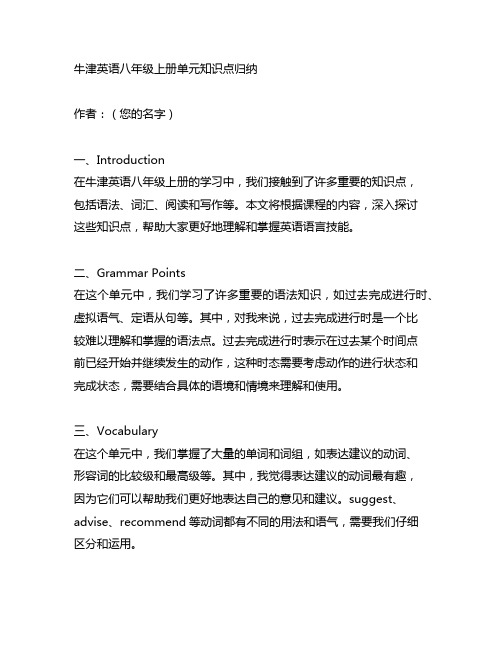
牛津英语八年级上册单元知识点归纳作者:(您的名字)一、Introduction在牛津英语八年级上册的学习中,我们接触到了许多重要的知识点,包括语法、词汇、阅读和写作等。
本文将根据课程的内容,深入探讨这些知识点,帮助大家更好地理解和掌握英语语言技能。
二、Grammar Points在这个单元中,我们学习了许多重要的语法知识,如过去完成进行时、虚拟语气、定语从句等。
其中,对我来说,过去完成进行时是一个比较难以理解和掌握的语法点。
过去完成进行时表示在过去某个时间点前已经开始并继续发生的动作,这种时态需要考虑动作的进行状态和完成状态,需要结合具体的语境和情境来理解和使用。
三、Vocabulary在这个单元中,我们掌握了大量的单词和词组,如表达建议的动词、形容词的比较级和最高级等。
其中,我觉得表达建议的动词最有趣,因为它们可以帮助我们更好地表达自己的意见和建议。
suggest、advise、recommend等动词都有不同的用法和语气,需要我们仔细区分和运用。
四、Reading Comprehension阅读理解是英语学习中非常重要的一部分,通过阅读能够扩大我们的词汇量和语言表达能力。
在本单元中,我们接触了一些有趣的阅读材料,包括新闻报道、小说片段等。
其中,我印象最深刻的是一篇关于环保的文章,它提醒我们应该如何保护环境,守护地球,这让我深刻理解到环保问题的重要性。
五、Writing Skills写作是提高英语能力的重要途径之一,通过写作能够更好地表达自己的想法和观点。
在这个单元中,我们学习了如何写议论文、书信等不同类型的作文。
我觉得写议论文是一个挑战,因为需要我们清晰地表达自己的观点,同时能够提出有说服力的论据和证据。
六、Conclusion通过本单元的学习,我对这些重要的知识点有了更深入的理解和掌握。
通过不断的练习和实践,相信我在英语学习中会取得更好的成绩。
我也意识到学习英语不仅仅是学习语法和词汇,更重要的是要理解和运用语言背后的文化和思维方式。
牛津译林八年级英语上册Unit8知识点总结归纳
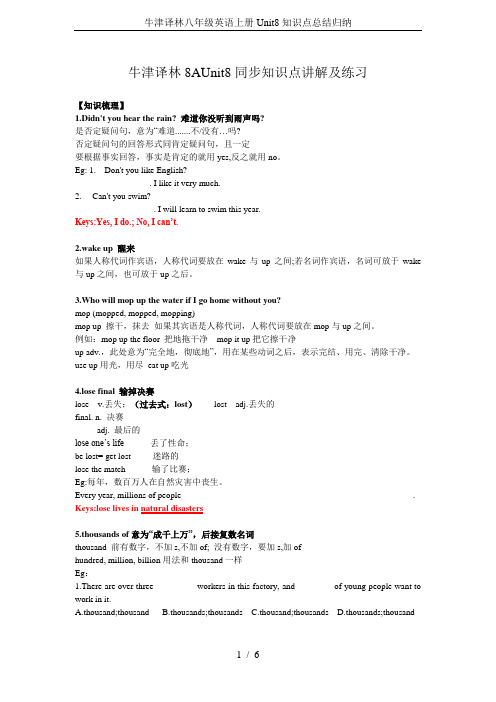
牛津译林8AUnit8同步知识点讲解及练习【知识梳理】1.Didn't you hear the rain? 难道你没听到雨声吗?是否定疑问句,意为“难道.......不/没有…吗?否定疑问句的回答形式同肯定疑问句,且一定要根据事实回答,事实是肯定的就用yes,反之就用no。
Eg: 1.---Don't you like English?---_______________. I like it very much.2. ---Can't you swim?---________________. I will learn to swim this year.Keys:Yes, I do.; No, I can’t.2.wake up 醒来如果人称代词作宾语,人称代词要放在wake与up之间;若名词作宾语,名词可放于wake 与up之间,也可放于up之后。
3.Who will mop up the water if I go home without you?mop (mopped, mopped, mopping)mop up 擦干,抹去如果其宾语是人称代词,人称代词要放在mop与up之间。
例如:mop up the floor 把地拖干净mop it up把它擦干净up adv.,此处意为“完全地,彻底地”,用在某些动词之后,表示完结、用完、清除干净。
use up用光,用尽 eat up吃光4.lose final 输掉决赛lose v.丢失;(过去式:lost)lost adj.丢失的final. n. 决赛adj. 最后的lose one’s life 丢了性命;be lost= get lost 迷路的lose the match 输了比赛;Eg:每年,数百万人在自然灾害中丧生。
Every year, millions of people_____________________________________________________. Keys:lose lives in natural disasters5.thousands of意为“成千上万”,后接复数名词thousand 前有数字,不加s,不加of; 没有数字,要加s,加ofhundred, million, billion用法和thousand一样Eg:1.There are over three__________workers in this factory, and_________of young people want to work in it.A.thousand;thousandB.thousands;thousandsC.thousand;thousandsD.thousands;thousand2.______students went to the university to listen to the_____ speech.A.Thousand of;120-minutesB.Thousands of;120-minutesC. Two thousands: 120- minutesD. Two thousand; 120-minuteKeys:C;D6.wash away 冲走如果人称代词作宾语,人称代词要放在wash与away之间;若名词作宾语,名词可放于wash 与away之间,也可放于away之后。
八年级上册英语unit8详细知识点

八年级上册英语unit8详细知识点Unit 8: At the weekends八年级上册英语 unit 8 详细知识点Unit 8 is all about talking about how people spend their weekends or free time. In this unit, you will learn different activities that people do on weekends along with their preferences. The unit involves different vocabulary, grammar, reading, writing, and speaking exercises.词汇 (Vocabulary)1. prefer (v) – to like something more than others2. outdoor (adj) – related to the outside or outdoors3. indoor (adj) – related to the inside or indoors4. watch (v) – to look at something carefully, especially a movie ora TV show5. attend (v) – to go to an event or a place6. involve (v) – to be a part of or to include something7. practice (v) – to do something repeatedly to get better at it8. recent (adj) – happening or done not long ago9. basically (adv) – in a simple way, without unnecessary details10. participate (v) – to take part in an activity or event语法 (Grammar)1. Simple Present TenseThe simple present tense is used to talk about things that you do regularly or things that are true in general.Example: I usually sleep till late on Sundays.2. Adverbs of FrequencyAdverbs of frequency are used to talk about how often something happens.Examples:- I always go to the gym on Saturdays.- She never misses her dance classes.3. Present Continuous TensePresent continuous tense is used to talk about things that are happening right now or things that are in progress.Example: We are playing basketball at the park right now.4. How to ask and answer about weekend activitiesAsking:- What are you doing this weekend?- What do you usually do on Sundays?- How do you spend your free time?Answering:- I like to watch movies on weekends.- I usually play video games with my friends.- We like to go for a picnic in the park.阅读 (Reading)Reading exercises are given in the form of passages or short stories. The passages can involve different themes related to weekend activities.写作 (Writing)In Unit 8, you will be asked to write different types of short paragraphs or essays related to weekend activities. You will need to use proper vocabulary and sentence structures to convey your ideas effectively.口语 (Speaking)In the speaking exercises, you will be asked to talk about different activities that you like or dislike doing on weekends. You will need to use proper sentence structures and vocabulary to convey your ideas effectively. Additionally, you will be asked to engage in conversations with your classmates to demonstrate your speaking abilities.总结 (Conclusion)In conclusion, Unit 8 of the 8th grade English book is all about weekend activities and how to talk about them in English. With proper understanding and practice of vocabulary, grammar, reading, writing, and speaking exercises, you can easily master this unit and improve your English communication skills.。
牛津深圳版英语八年级上册Unit 8 English Week课件

Unit 8 English Week
Read the clues and work out the answers to the crossword puzzle with proper words. 阅读线索,用正确的单词算出填字游戏的答案。
in
the
speaking
F competition.
slowly
Reading listening grammer speaking writing Practice
Unit 8 English Week
T ④Amy thought it was worth holding the English Week.
⑤You should read English books and magazines to
T improve your English.
Reading listening grammer speaking writing Practice
Unit 8 English Week
Reading listening grammer speaking writing Practice
Unit 8 English Week
Reading listening grammer speaking writing Practice
Unit 8 English Week
Reading listening grammer speaking writing Practice
Unit 8 English Week
Words review
speech
Unit8重要知识点知识点牛津译林版英语八年级上册

8A U8【wele】1.I was sleeping when it started to rain.when引导的时间状语从句,was sleeping是过去进行时。
过去进行时构成:was/were+ving,表示过去某个时间正在进行的动作。
2.Didn’t you hear the rain?否定疑问句,表示一种惊讶或反问、失望、责难等语气。
都定疑问句应翻译为“难道....不吗?”否定疑问句用法1)表示说话人语预期或希望得到肯定答复。
Haven’t you finished yet?你还没有结束吗?2)表示赞叹或感慨,意为“真是....”,译成汉语是,句末用感叹号。
Isn’t it a fine day today?今天的天气多么晴朗啊!3)表示批评、厌烦、责难等。
Can’t you walk a little faster?难道你不能走快点吗?4)表示教客气地提出请求、邀请等。
Won’t you e and have dinner with us?难道你不想和我们一起吃晚饭吗?3.mop up用拖把完全擦干净(名随代中)eat up吃光use up用光end up结束pay up付清4.具体数字+hundred/thousand/millionhundreds/thousands/millions of...5.coach n.长途汽车n.教练;私人教师vt.训练,指导6.crash vi.“碰撞,撞击”crash into 撞上7.wash away冲走(名随代中)8.start vt.引起vi.出发;开始9.hear about/of 听说表示间接听说关于某人或某事的情况hear 听见表示亲耳听见某事或某人说话hear from 收到...来信+sb表示“收到某人的来信”10.hit vt.袭击;危害hithittinghit11.catch a fire着火= sth be on fire【reading】vt.“摇动,震动”shake hands with sb与某人握手shake one’s head摇头3.loud adj.响亮的;大声的;喧闹的loudloudly4.in fear处于恐惧状态5.try/do one’s best to do sth尽某人最大的努力做某事6.run out跑出来;(时间、食品、金钱等无生命名词)用完run out of 从...跑出来;把...用完7.in all direction = in every direction 四面八方8.fall down ①“掉落;下落”②“跌倒,倒下”后面接宾语时要加介词fromfall over “跌倒”,一般指向前摔倒,其后不加宾语fall off “跌落,从...掉下来”,后面可以直接加宾语9. e down ①崩塌,坍塌②(价格)下降10.not...at all “一点也不,根本不”,at all放在句尾用于加强否定的语气。
八年级英上第八单元知识点

八年级英上第八单元知识点本文主要介绍了八年级英语上册第八单元的知识点,包括语法、词汇、听力、口语、阅读和写作等内容。
通过学习本单元,学生可以提高语言综合运用能力,为英语学习打下坚实的基础。
一、语法本单元的语法重点是过去进行时,用在描述过去某个时间或事件正在发生的情况。
其句式为“主语+was/were +现在分词”。
此外,本单元还包括一般过去时和过去完成时的复习和运用。
例:Last night, I was watching TV when my friend called.二、词汇本单元涉及到了丰富的词汇,包括家庭成员、运动、身体部位、时间词等。
学生需要掌握这些词汇的发音、拼写和用法,加强词汇积累并能够熟练运用。
例:My father is a doctor and my mother is a teacher.三、听力本单元的听力旨在提高学生对英语自然语音和基本用语的理解和掌握。
学生需要仔细聆听并理解听力材料,从中获取信息和答案。
例:听力材料一般包括短对话、长对话、新闻报道等,会围绕本单元的话题展开,如时间、活动、家庭、生活等。
四、口语本单元的口语任务涉及到英语日常交际的方方面面,如问候、介绍、约会、邀请等。
学生需要熟悉常用口语表达,提高口语技能和语感。
例:A: Hi, how are you?B: I'm fine, thank you. And you?A: I'm good, thanks.五、阅读本单元的阅读材料旨在拓展学生的阅读量和阅读理解能力。
学生需要理解文中表达的意思,把握关键信息并做出相应的判断和推断。
例:阅读材料一般包括短文、长文、广告等,内容涉及家庭、运动、健康等话题。
六、写作本单元的写作任务涉及到口头表达和书面表达两个方面,包括描述自己的家庭、介绍自己的爱好、写邀请函等。
学生需要熟练运用所学语法和词汇,提高写作能力。
例:My FamilyI have a happy family. My father is a doctor and my mother is a teacher. I have a brother and a sister. We love each other and often do sports together. My favorite sport is basketball. What about you?。
八年级上册u8英语知识点总结

八年级上册u8英语知识点总结自从初中入学以来,我们学生们的课业压力和学习内容都越来越多。
学习英语也不例外。
在八年级上册的英语课中,我们上了很多有趣的课程,学习了很多新的知识点,其中Unit 8是一个非常重要的单元。
本文将详细介绍八年级上册英语Unit 8课程中的主要知识点。
1. 一般过去时在英语中,一般过去时经常用来描述过去发生的事件和状态。
动词在语态上通常会从原来的现在时态变成过去时态。
例如,动词“work”(工作)在一般过去时变成了“worked”(工作过)。
2. 时间副词在英语语言中,时间副词经常用来表示时间的持续和频率。
例如,每天(every day)、仅一次(once)、从来没有(never)、有时(sometimes)、通常(usually)等。
在Unit 8中,我们还学习了短语“last night”(昨晚)、“yesterday afternoon”(昨天下午)和“in the morning”(早晨)等。
3. 特殊疑问句在英语语言中,特殊疑问句通常起到查询信息的作用。
例如,我们说“What did you do last night?”(昨晚你做了什么?)。
这句话利用了“did”和“you”两个关键词,表示询问者关于另一个人或者自己的特定事件的查询。
4. 过去进行时英语中过去进行时通常表示一个过去发生的持续性事件。
通常用“was /were + verb+ -ing”来表示。
例如,我们说“I was watchingTV when she called me up.”(当她打电话给我时,我正在看电视。
)5. 点和段时间点时间和段时间是我们英语中的两个重要概念。
点时间通常指某一个特定时间,如1:30pm。
而段时间通常由起止时间组成,如“from 2pm to 4pm”。
在Unit 8中,我们学习了一些常见的点时间词和段时间短语,例如“at 8:00”(在8点)、“from 9 to 11”(从9到11点)和“in the afternoon”(下午)。
牛津深圳版英语八年级上册Unit 8 English week 重难点知识归纳总结
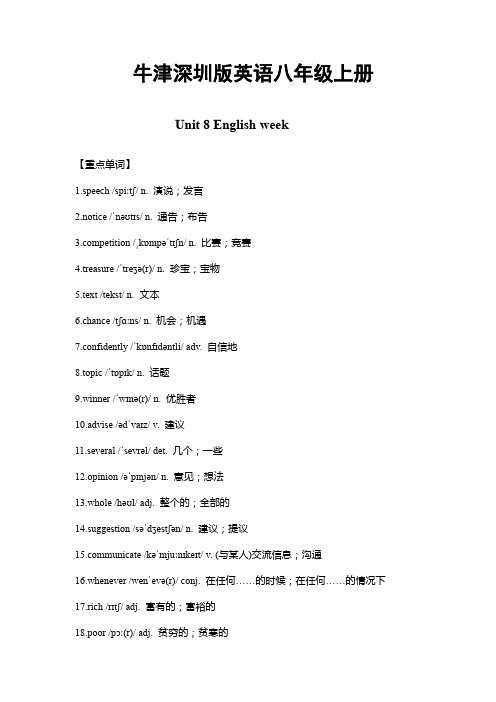
牛津深圳版英语八年级上册Unit 8 English week【重点单词】1.speech /spiːtʃ/ n. 演说;发言2.notice /ˈnəʊtɪs/ n. 通告;布告petition /ˌkɒmpəˈtɪʃn/ n. 比赛;竞赛4.treasure /ˈtreʒə(r)/ n. 珍宝;宝物5.text /tekst/ n. 文本6.chance /tʃɑːns/ n. 机会;机遇7.confidently /ˈkɒnfɪdəntli/ adv. 自信地8.topic /ˈtɒpɪk/ n. 话题9.winner /ˈwɪnə(r)/ n. 优胜者10.advise /ədˈvaɪz/ v. 建议11.several /ˈsevrəl/ det. 几个;一些12.opinion /əˈpɪnjən/ n. 意见;想法13.whole /həʊl/ adj. 整个的;全部的14.suggestion /səˈdʒestʃən/ n. 建议;提议municate /kəˈmjuːnɪkeɪt/ v. (与某人)交流信息;沟通16.whenever /wenˈevə(r)/ conj. 在任何……的时候;在任何……的情况下17.rich /rɪtʃ/ adj. 富有的;富裕的18.poor /pɔː(r)/ adj. 贫穷的;贫寒的19.hide /haɪd/ v. (hid, hidden)藏;隐蔽20.attack /əˈtæk/ v. 袭击;攻击21.shy /ʃaɪ/ adj. 羞怯的;腼腆的22.else /els/ adv. 其他的;别的23.choose /tʃuːz/ v. (chose, chosen)选择;挑选【重点短语】1.treasure hunt 寻宝游戏2.in public 公开地;在别人(尤指生人)面前3.put on 上演4.in my opinion 依我看5.above all 最重要的是;尤其是6.look out 小心;当心7.give a speech 做演讲,发表演说8.give sb. a chance to do sth. 给某人做某事的机会9.take part in 参加,参与10.all the time 始终;一直11.not at all 一点儿也不12.switch...off 关闭……13.set a trap 设陷阱;设圈套14.belong to 属于15.at a time 一次;每次【重点句型】1.The students had to speak on a topic in English for two minutes.学生们必须就一个话题用英语讲两分钟。
牛津版沪教版英语八年级(上)Unit-8-English-week-词句讲解+练习+答案

牛津版沪教版英语八年级(上)U n i t-8-E n g l i s h-w e e k-词句讲解+练习+答案-CAL-FENGHAI.-(YICAI)-Company One1Unit 8 English week词汇讲解1. notice(1)notice作名词,意为“布告,启事”,是可数名词。
例如:We have put a notice of renting these flats in the newspaper.我们已经在报上登了出租这几套房的启事。
(2)notice作名词,意为“预告,警告”,是不可数名词。
例如:These rules can’t be changed without notice. 这些规则不预先通知不可以随便更改。
(3)notice作名词,意为“注意”,是不可数名词。
常用的词组有:take notice of sb./sth.意为“注意某人/某物”。
Take notice of what they say. 注意听他们说。
(4)notice作动词,意为“注意到,留心,看到”。
常用于notice sb. do sth.或 notice sb. doing sth.第一个短语表示注意到某人做某事(注意到某人作某事的全过程)。
第二个短语表示“注意到某人正在做某事”(表示正在进行的动作)。
例如:Didn’t you notice He has dyed his hair. 你没注意吗他染了头发。
Did you notice Jack come in 你注意到杰克进来了吗Did you notice his hand shaking 你有没有注意到他的手在抖He was noticed to leave the house an hour ago. 一小时前有人注意到他离开了这所房子。
(被动)2. advise(1)advise用作动词表示“建议”,和suggest是同义词,后面都可接名词、代词和动名词作宾语。
- 1、下载文档前请自行甄别文档内容的完整性,平台不提供额外的编辑、内容补充、找答案等附加服务。
- 2、"仅部分预览"的文档,不可在线预览部分如存在完整性等问题,可反馈申请退款(可完整预览的文档不适用该条件!)。
- 3、如文档侵犯您的权益,请联系客服反馈,我们会尽快为您处理(人工客服工作时间:9:00-18:30)。
8A Unit 8 English Week
语言要点
I 重点词组
1. have fun doing sth 做某事很开心
2. give sb a chance 给某人一次机会
3. confidently 自信; confident; confidence
4. in public 在公共场合
5. make a big success 获得成功
6. put on 上演
7. take part in 参加
8. advise sb to do sth 建议某人做某事9. had better do sth 最好做某事10. several = some/ a few 几个, 一些11. In my opinion= I think 在我看来12. be worth doing sth 值得做某事13. give a speech to sb 给某人做演说
14. give sb suggestions 给某人建议= advise sb to do sth
15. improve their English 提高他们的英语水平
16. communicate …with… 与…交流17. above all = at first 首先;最重要的是
II 重点句
st week, students worked hard to make their English Week a big success.
上周,学生们认真学习使英语周获得成功。
2. If they want to be good public spe akers, they’d better speak clearly and confidently.
如果他们想成为好的公共演讲者,他们最好是要清晰、自信地表达。
3. It gave me a chance to learn new words. 它给了我一个学习新单词的机会。
4. It’s well worth doing. 它值得一做。
5. He gave students some suggestions on how to improve their English.
他给了学生一些关于提高英语水平的建议。
6. Above all, you should enjoy English. 最重要的是,你们要享受英语。
II 课文知识点学习
1.hard adj.________ adv. __________ hardly _______adv.
You should work ________(hard) to improve your English.
2. make a big success = _________________ a big success
make ______________ 弄得混乱make ______________谋生
make ______________ 发出噪音make ______________ 犯错
make______________ 确信make up ______________ 下定决心= decide make ______________ 取笑某人be made ______________ 由…组成
be made ______________ 由…制成be made______________ 在…制成
3. 写出下列词的名词形式
win v. _________n. happy adj. ___________n. advise v. __________n. speak v. __________n. confidently adv. _____________n.
4. had better 最好(表建议)
--Lily is ill in bed now. –She’d better _________________________.
--I’m often late for school. --__________________________________.
--The typhoon is coming. -- __________________________________.
5. enjoy doing sth = _________________ sth = have a good time ______ sth 做某事很开心
________________________ in the water.= ________________________in the water.
我们在水里玩得很开心。
6. be worth doing 某事值得做
The book is worth _______.
仿例造句:______ is worth _________.
7. 按要求写单词
suggestion n. __________v. communicate v. ________________n.
improve v. ________________n.
归类:move --movement develop ---development
8. communicate…with sb与某人交流=_______________
9. above all =________________________
III 复习课文,完成思维导图
IV 根据实际及提示完成短文
English Week at Fu’an School
I still remember last year’s English Week in our school. In my ________, it was a great _________.
There were lots of ___________(act). Some students ______(put) ______ the English ______(play). Some students ______ (take)______ ______English Newspaper C_________ Other students ______(join) _______an English ________(speak) C__________. We also _________(enjoy) English movies.
As for me, I _______ ______ in ________________________. I had to _________. At last, I ____________ , I was so __________.
In a word, I really enjoyed English Week. It gave me a chance to ______________________.。
